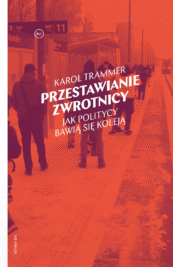15 października o godz. 18.00 w Faktycznym Domu Kultury z autorami Nierówności po polsku – Jakubem Sawulskim, Michałem Brzezińskim i Pawłem Bukowskim – porozmawia Agnieszka Lichnerowicz. Zapraszamy na spotkanie wokół premiery pierwszej kompleksowej monografii o nierównościach w Polsce.
Na sejmowej komisji infrastruktury, podczas której dyskutowano o polityce mieszkaniowej, stronę społeczną reprezentowała pani Iwona Sroka, członkini zarządu Murapola, jednego z największych polskich deweloperów. Pani Sroka zdecydowanie poparła uruchomienie rządowej polityki mieszkaniowej, w tym Kredytu na start, który według niej, w odróżnieniu od Bezpiecznego Kredytu 2 proc., nie doprowadzi do wzrostu cen mieszkań, ponieważ obecnie sytuacja gospodarcza jest inna niż rok temu. Poza tym budownictwo mieszkaniowe jest kołem zamachowym polskiej gospodarki.
Pani Sroka nie mogłaby opowiadać tych wszystkich prodeweloperskich teorii, a przynajmniej byłoby jej nieco trudniej, gdybyśmy dysponowali dokładnymi danymi na temat wpływu dopłat do kredytów na rynek nieruchomości. Gdyby polski rząd poprzedził tworzenie kolejnych programów wspierających popyt przygotowaniem lub zleceniem szczegółowego raportu, podsumowującego skutki wszystkich poprzednich programów mieszkaniowych, nie bylibyśmy bezbronni wobec propagandy lobbystów.
To zresztą dotyczy wszystkich programów polityki ekonomicznej i społecznej, które od dekad są w Polsce wprowadzane na ślepo lub pod wpływem operacji lobbingowych. Oczywiście najlepszym przykładem było uruchomienie OFE, które zostały podpowiedziane Polsce przez rynki finansowe. Dopiero gdy skutki drenowania ZUS z części składek, z których sute prowizje pobierali sobie operatorzy funduszy, stały się jednoznaczne, kolejne rządy zaczęły się z tego rakiem wycofywać – najpierw Tusk, potem Morawiecki (jak widać, czasem ciągłość polityki się w Polsce udaje).
Kto naprawdę cierpi, a kto mydli nam oczy?
W wyniku ogromnych białych plam w wiedzy o sytuacji społeczno-ekonomicznej utrzymywanych jest mnóstwo jawnie niesprawiedliwych rozwiązań, głównie dzięki aktywnemu lobbingowi grup interesu oraz ich zmanipulowanych zwolenników, którzy są przekonani, że sami kiedyś do tych grup dołączą (niektórym może się to nawet udaje).
Autorzy wydanej właśnie przez Krytykę Polityczną książki Nierówności po polsku, Paweł Bukowski, Michał Brzeziński i Jakub Sawulski, wśród swoich „10 pomysłów na bardziej równościową politykę publiczną” wymieniają podniesienie jakości danych statystycznych. Bezpośrednio nie przełoży się to na lepszą redystrybucję, pośrednio zdecydowanie tak. Poznanie prawdy o polskich nierównościach, rozkładzie dochodów i majątku oraz sytuacji finansowej poszczególnych grup zawodowych i branż pozwoli nie tylko na lepsze projektowanie kolejnych programów społecznych i reform podatkowych, ale przede wszystkim na odkłamywanie przeróżnych mitów krążących w polskiej debacie publicznej.
Jednym z przykładów takich niesprawiedliwych rozwiązań, o których utrzymanie nieustannie dbają lobbyści grup interesów oraz ich kibice, są przywileje podatkowo-składkowe jednoosobowych działalności gospodarczych. Obecnie lobbyści z Polski 2050 próbują jeszcze te przywileje poszerzyć, postulując likwidację proporcjonalnej składki zdrowotnej. Ich argumenty są dobrze znane. Mikroprzedsiębiorcy, podobnie jak deweloperzy, są podobno kołem zamachowym polskiej gospodarki. Niestety ci rzutcy biznesmeni przeraźliwie cierpią z powodu podatków i składek, chociaż płacą je niższe niż etatowcy.
Lobbyści jednoosobowych przedsiębiorców mogą nawijać nam makaron na uszy, gdyż w gruncie rzeczy niewiele mamy dokładnych danych o dochodach tych ostatnich. Aż dziw bierze, że ten rzekomy motor polskiego rozwoju jest tak słabo przebadany. Musimy się opierać na szczątkowych informacjach, takich jak dane Ministerstwa Finansów o rozliczeniu podatku PIT, które jednak nie ujmują dokładnego rozkładu dochodów, a co najwyżej średnią dla całych grup (np. liniowców). GUS również tego nie robi, gdyż większość swoich publikacji o dochodach opiera na danych wynagrodzeń etatowców i to jeszcze z firm powyżej dziewięciu pracowników. Z publikacji GUS możemy się dowiedzieć co najwyżej o wysokości średniego dochodu rozporządzalnego na głowę w gospodarstwie domowym statystycznego przedsiębiorcy.
Regularne (np. coroczne) i szczegółowe raporty o sytuacji finansowej jednoosobowych działalności gospodarczych pokazałyby nam, kto tak naprawdę jest w trudnej sytuacji, a kto mydli oczy, walcząc o jeszcze więcej. Opinia publiczna widziałaby czarno na białym, że przedsiębiorcy na liniowym drastycznie odstają dochodami od pozostałych grup zawodowych, więc dopieszczanie ich kolejnymi przywilejami jest idiotyczne. Wiedza o dokładnym rozkładzie dochodów mogłaby też pomóc w identyfikacji drobnych przedsiębiorców, którzy faktycznie mają ciężko – tacy też są, chociaż w zdecydowanej mniejszości – dzięki czemu można byłoby im skuteczniej pomóc. No i przede wszystkim zobaczylibyśmy wreszcie, że opowieści o kole zamachowym polskiej gospodarki to zwykłe kpiny – JDG to koło zamachowe co najwyżej optymalizacji podatkowej. Nie znaczy to, że każdy na JDG oszukuje – ja jestem i nie oszukuję (a przynajmniej staram się).
Kumulacja bogactwa i nierówność szans
GUS powinien podawać też dokładny rozkład dochodów całego społeczeństwa oraz ich źródeł – obejmując pracowników etatowych, przedsiębiorców, rentierów, emerytów i osób utrzymujących się z zasiłków. Dzięki temu poznalibyśmy prawdziwy podział klasowy w Polsce, a ludzie z klasy wyższej nie mogliby udawać średniaków, domagając się kolejnych przywilejów. Dowiedzielibyśmy się też, czy osoby korzystające z pomocy społecznej rzeczywiście mają życie jak w Madrycie, jak teoretyzują lobbyści grup interesu oraz ich poplecznicy, czy jednak klepią biedę, z której nie potrafią się wyrwać. Obecnie najbardziej szczegółowy rozkład dochodów stanowi publikacja Struktura wynagrodzeń według zawodów, która obejmuje tylko pracowników etatowych i jest wydawana co dwa lata.
Brakuje także danych na temat nierówności majątkowych, które są w Polsce jedną wielką białą plamą na mapie wiedzy. Autorzy Nierówności po polsku przypominają o bardzo udanym badaniu NBP Zasobność gospodarstw domowych w Polsce, które w czasach Adama Glapińskiego nie jest już kontynuowane. Przeprowadzono tylko dwie tury badań – w 2014 i 2016 roku. Tymczasem poznanie rozkładu majątku w polskich gospodarstwach domowych pokazałoby prawdziwą skalę nierówności ekonomicznych w kraju i pomogło w stworzeniu lepszego prawa podatkowego odnośnie do spadków i darowizn. Obecnie w ramach najbliższej rodziny można przekazywać majątek bez żadnego opodatkowania, co przekłada się na kumulację bogactwa i nierówność szans.
Te ostatnie również są niezbadane. Chyba najlepszym studium były dwie tury badań IBE Uwarunkowania decyzji edukacyjnych, które zobrazowały trudności w zdobyciu wykształcenia wśród osób z gospodarstw domowych o niskim kapitale kulturowym i mieszkańców peryferii. A także pokazały, jak bardzo wysoki kapitał kulturowy rodziców pomaga w osiągnięciu sukcesu edukacyjnego. To jednak badanie z 2014 roku, tymczasem od tamtej pory wiele się zmieniło.
Dogłębne zbadanie czynników nierówności szans w Polsce pokazałoby, że opowieści o byciu kowalem własnego losu to wierutne bzdury, gdyż na sukces w przemożnym stopniu wpływa wykształcenie rodziców, majętność gospodarstwa domowego czy miejsce urodzenia. Dzięki temu różni znani ludzie, mieszkający od pokoleń w Warszawie, nie mogliby swobodnie opowiadać o wydobywaniu się z biedy, bo ich tata pracował w fabryce, a mama w sklepie – zamieszkiwanie w stolicy od pokoleń jest jednym z tych czynników, które w największym stopniu ułatwiają sukces zawodowy i majątkowy.
Jeden agresywnie optymalizuje podatki, drugi dba o pracowników
W opinii publicznej popularna jest również teza, że zagraniczne korporacje unikają podatku CIT. Według niektórych komentatorów oraz lobbystów należy więc rzekomo dobrowolny CIT zlikwidować i wprowadzić w jego miejsce podatek przychodowy (obrotowy). Ministerstwo Finansów mogłoby więc publikować co roku dokładny raport na temat rozliczenia CIT z podziałem na branże, narodowość kapitału i dokładną analizą struktury kosztów. Dzięki temu moglibyśmy się przekonać, kto faktycznie agresywnie optymalizuje podatki, a kto ma wysokie koszty, bo dobrze płaci pracownikom albo prowadzi kosztowną działalność. Moglibyśmy też poznać prawdziwe skutki wprowadzenia podatku obrotowego, który prawdopodobnie zdemolowałby najbardziej kosztochłonne – czyli też najbardziej zaawansowane – branże, za to pomógł niektórym biznesom, w których koszty odgrywają znacznie mniejsze znaczenie.
Usystematyzowana i pogłębiona wiedza na temat sytuacji ekonomicznej i społecznej w Polsce pomogłaby państwu i stronie społecznej – tej prawdziwej, a nie przedstawicielom deweloperów – chronić się przed szkodliwym wpływem lobbystów oraz ich błądzących zwolenników. Bez niej nadal będziemy państwem rozrywanym przez grupy interesu, w którym przewaga siły i pozycji wydatnie pomaga w wychodzeniu na swoje.

 Wspieraj
Wspieraj 

 Wspieraj
Wspieraj  Wydawnictwo
Wydawnictwo 
 Zaloguj się
Zaloguj się 
















